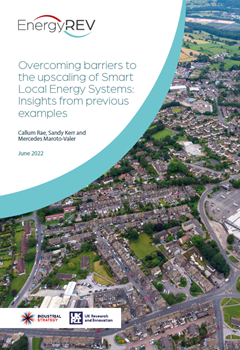Callum Rae, Sandy Kerr and Mercedes Maroto-Valer
30 June 2022
As the transition towards a more sustainable, distributed energy model has continued to gather pace, the number of Smart local energy projects has increased. Ranging in age, size, location and complexity, these projects have faced a series of technical, social and economic challenges, with varying degrees of success.
As such, these projects – and the communities and organisations involved in their development and operation – represent a significant source of practical knowledge and expertise. Learning from the experience of previous and existing projects can help support innovation and continued development in the sector, while also helping industry and policy makers identify unsuccessful or ineffective technologies, designs, policy interventions and management and governance approaches. Existing and previous examples of local and community energy projects have an important role to play in informing the delivery and upscaling of successful SLES in future.
This report presents the findings from four in-depth case studies, examining the experiences and outcomes of existing Smart Local Energy Systems (SLES). These case studies provide insight into how upscaling occurs in practice, the barriers which impact it, and how it can usefully be promoted or facilitated in future. The report concludes by presenting four broad-ranging and transformational recommendations, intended to help mitigate the identified barriers to upscaling in future.
